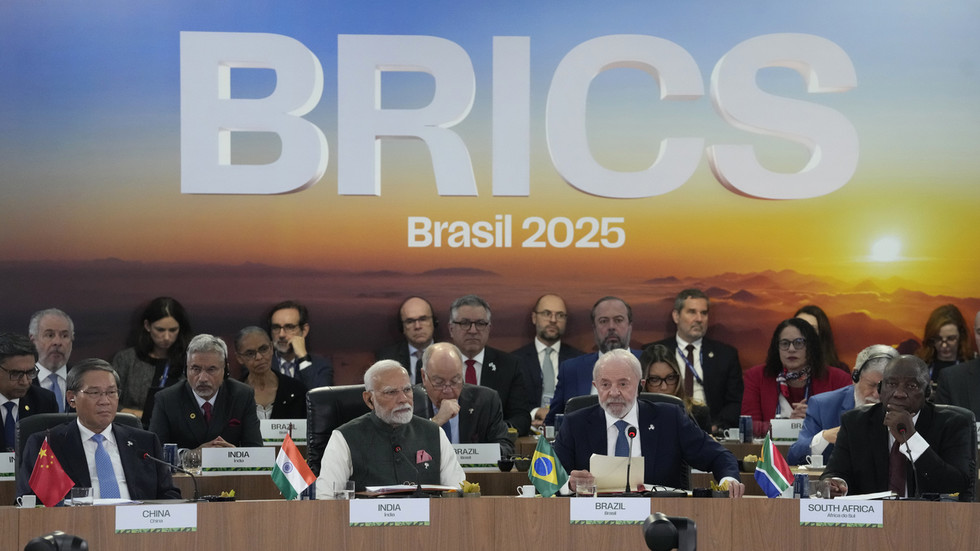The idea of a multipolar world has long been used in two distinct contexts. One is when global hegemony is solid and unchallenged, as it was for the decade and a half following the Cold War. In that case, ‘multipolarity’ serves as little more than a slogan – a symbolic protest against US dominance, with no practical strategy behind it.
The other is when that hegemony has fully collapsed, and international relations revert to their historical norm: a fluid, unpredictable interplay of states with differing levels of power. Then, multipolarity becomes a fact, and actions are guided by immediate context.
Today’s world fits neither condition. The old unipolar order is fading, but its structures and reflexes remain. That is why the current moment is so peculiar – and why BRICS has become such an important indicator of the transition underway. This group of nations, for all its diversity and contradictions, reflects the emerging outlines of a world less shaped by Western control.
The latest BRICS summit in Rio de Janeiro prompted disappointment in some quarters. Several key leaders were absent, and the headlines lacked drama. Compared to last year’s bold meeting in Kazan, it seemed muted. But this calmer tone is not a setback – it reflects the changing environment BRICS now operates in.
Three trends help explain the summit’s tone. First, global tensions are rising. The recent clashes between India and Pakistan, and between Israel and Iran, directly involve BRICS members. While not full-blown conflicts within the group, they underscore a lack of unity. As BRICS expands, internal diversity increases, making it harder to maintain a single voice. The natural result is cautious language and vague formulations. That may frustrate observers, but it reflects realism.
Second, the United States under Donald Trump has adopted a more explicitly anti-BRICS stance. Washington has issued direct threats and imposed new duties on countries perceived to be aligned with the bloc. These efforts have a clear goal: to deter deeper cooperation between BRICS members. So far, they have not provoked open defiance. Most BRICS countries remain wary of direct confrontation with the West. Yet US pressure is steadily fueling resentment, and a firmer response may come if that pressure intensifies.
Third, the rotation of the BRICS presidency from Russia to Brazil altered the rhythm of the group’s activities. For Russia, BRICS is both a practical tool for economic coordination and a political platform that bypasses Western gatekeeping. Moscow invests heavily in its BRICS role. Brazil’s focus is different. Tied more closely to the West, it has other strategic priorities. That doesn’t mean Brasilia is uninterested in BRICS – only that it doesn’t treat it with the same urgency.
Still, something important has happened. The 2023 and 2024 summits in South Africa and Russia changed BRICS. The group has matured, acquiring a new identity. That development will take time to digest. India’s upcoming presidency may continue the current more restrained phase, but that should not be mistaken for stagnation. It is a necessary period of consolidation.
This is why the Rio meeting should be seen as a success. The early phases of BRICS expansion, when the group was seen as vague and aspirational, were relatively easy. No one expected much. Now, the stakes are higher. America and its allies, once dismissive, are paying close attention. They are actively probing for weaknesses. This alone shows that BRICS is starting to matter.
The group’s appeal lies in its alignment with real global trends. Today’s international environment demands flexibility, minimal obligations, and openness to difference. BRICS embodies these features. It avoids binding structures, embraces diversity, and operates on the basis of shared (though loosely defined) interests.
We are living in a time of disorder. There is no clear international balance, and no blueprint for restoring one. This transitional era will last, perhaps for decades. In the meantime, the world will increasingly look for platforms that reflect the new reality. BRICS is one of them.
The perception of the group is shifting. It is no longer treated as a rhetorical device or a curiosity. It is becoming part of the emerging architecture of a multipolar world. That evolution will be slow and uneven, but it is underway.
Following the summits in Johannesburg, Kazan, and now Rio, BRICS has entered a new phase. The challenge now is to recognize that change – and to adapt to it.
You can share this story on social media:
Read the full article here

